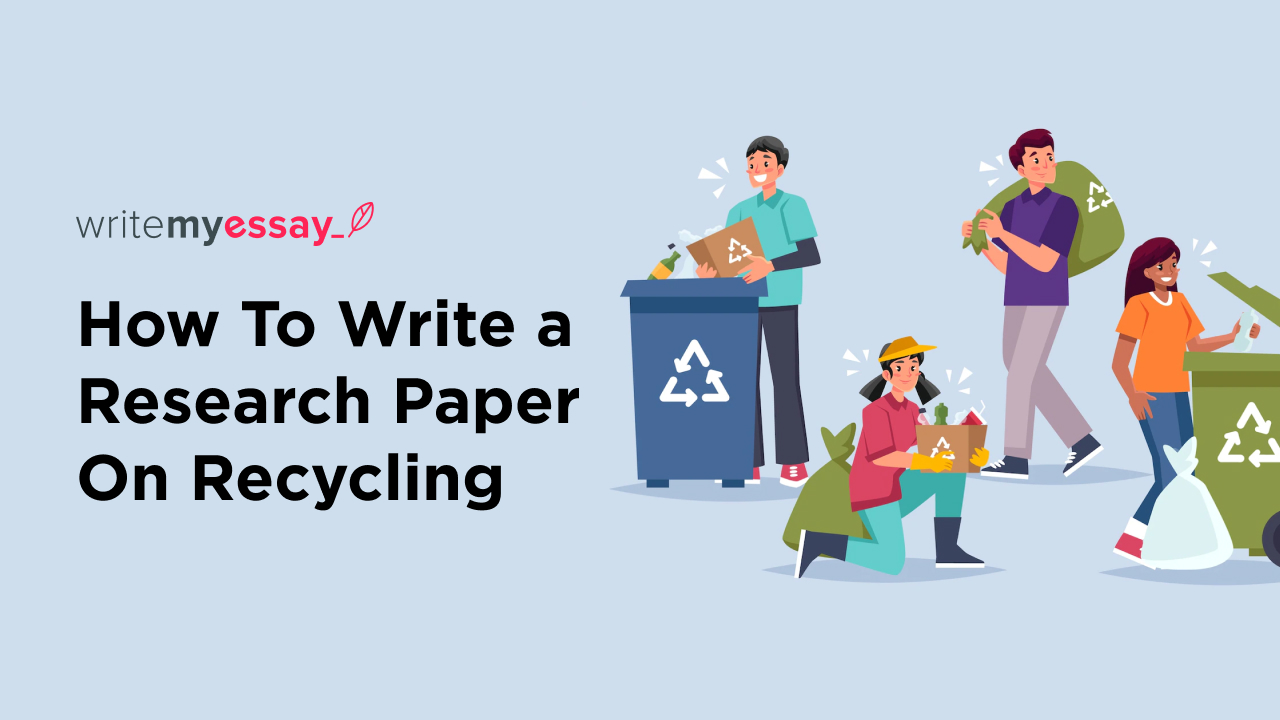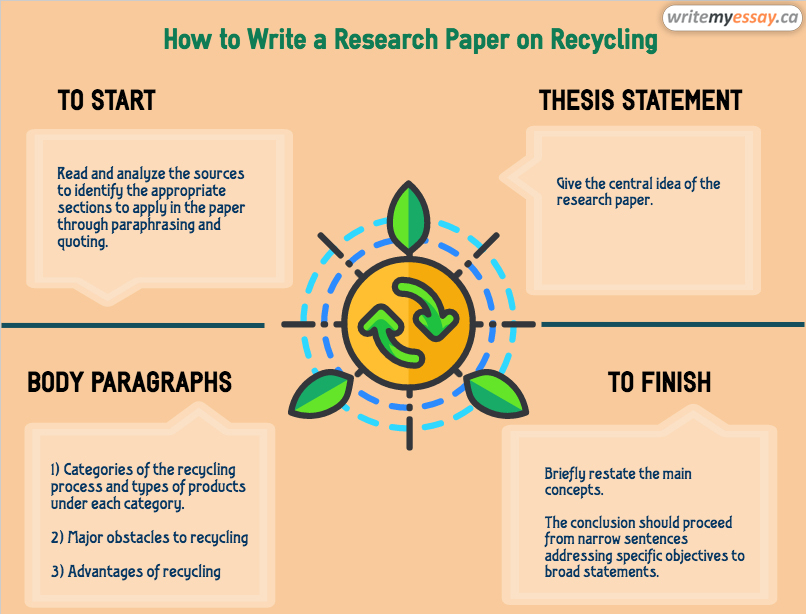
How To Write a Research Paper On Recycling

Table of Contents
Recycling Research Paper
- How to start a recycling research paper
- Tips on how to start
- Example of an outline
- Example of a thesis
- Example of an introduction for a recycling research paper
- How to write body paragraphs
- Tips on body writing
- Example of the first body paragraph
- Example of the second body paragraph
- Example of the third body paragraph
- How to finish a recycling research paper
- Tips on conclusion writing
- Example of a conclusion
- Research paper revision
- Tips on research paper revision

Recycling has gained much traction in the last half of the 20th Century. The affluence and wasteful ways of the past led human beings to a place and time where they have to think before utilizing the resources of the blue planet. Writing a research paper on different aspects of recycling cannot only equip the students with the necessary knowledge but also helps them in securing higher grades. Schools and colleges are now initiating schemes and projects to promote recycling and ensure that students are aware of the process and its importance and what would happen if they fall short on the duty.
How to start a research paper on recycling
A research paper on recycling touches on a very important aspect of the environment. Therefore, the presentation of authentic and effective discussion is necessary to inform the readers. A writer should carry out thorough research on relevant sources of information before starting to write. One can also plan on enough time to write hence avoiding challenges associated with quickly written papers. The writer can follow some tips in starting the research paper on recycling.
Tips on how to start
The author should collect enough relevant sources of supporting evidence from other scholars. The researcher can then read and analyze the sources to identify the appropriate sections to apply in the paper through paraphrasing and quoting. Another crucial tip for any writer is to establish the thesis statement that gives the central idea of the entire research paper. One can then prepare an outline of how they wish to structure the paper on recycling covering the main concepts. Thereafter, the author of the paper can prepare a draft with little attention to checking mistakes which they can correct during revision.
Example of an outline on recycling research paper
- Introduction: Definition and general information on recycling. Establishing the foundation for the paper.
- Body:
1) Categories of the recycling process and types of products under each category.
2) Major obstacles to recycling
3) Advantages of recycling - Conclusion
- References or the works cited
Example of a thesis
A thesis statement is very crucial when starting to write since it guides the writer on issues to cover in the discussion. It also notifies the reader of the main points to expect in the paper. The thesis statement should, therefore, give the central idea of the research paper. An example of a thesis statement for the research paper on recycling is, “This paper will discuss the existence of recycling through different periods of history, applications of the process by government and companies, advantages, and challenges experienced in the recycling of different substances”. The introduction of the research paper on recycling should be very impressive to motivate any reader who is concerned with the subject.
Example of an introduction for a recycling research paper
Recycling can be defined as passing already used substances through a process of treatment to recover part or whole of the previous substance for reuse. Recycling is aimed at conserving raw materials, reducing energy consumption, and also reducing disposal effects on the environment (Sally Morgan, 2009). Recycling has many advantages to the lives of people and the environment in general. It is important to note that recycling has been in existence all throughout history. For instance, there is evidence that suggests metals were recycled for use before the industrial revolution in Europe (Black Dog, 2010). Recycling has continued even after the industrial revolution because it is cheaper to recycle than produce new substances.
How to write body paragraphs
The body paragraphs of the research paper contain all information and ideas of the writer. Proper body paragraphs build on the thesis statement in detail. One should, therefore, revisit the thesis before and when writing body paragraphs. Various tips can assist the writer in developing an effective body of the paper.
Tips on body writing
Each of the body paragraphs should be structured specifically to discuss a unique idea or subtopic. The unique subtopic, therefore, requires a topic sentence under each of the paragraphs. However, the author should confine all ideas to the subject to avoid deviation from the main goal of the paper. In addition, the writer should present evidence from other sources to support the argument or the discussion of the paper in each of the paragraphs. The author of the research paper can then give opinions on the subject based on the available evidence. The passage from one paragraph to the next should be very clear by the use of transitional statements. The sentence structure should remain simple for information clarity.
Example of the first body paragraph
Wastes are categorized into industrial and consumer wastes. The recycling systems for the waste vary because of differences in refuse. The collection strategies of consumer wastes for recycling can be categorized into three which include: drop-off centers which involve consumers taking the substances to certain designated points; buy-back centers where redeeming of substances for the purpose of recycling and reselling takes place; roadside collection where a vehicle collects the substances (Silverman, 2008). Local and international laws majorly regulate the recycling systems of industrial wastes because they have a major impact on the environment. For instance, the United Nations Environmental Program (UNEP) collaborates with local authorities to implement relevant policies on recycling. Such policies cover a varied number of fields like the atmosphere, water bodies, and land and promote a green environment (Hall, 2008).
Example of the second body paragraph
In recent times, governments and companies have made important contributions toward promoting recycling processes. The great need to save energy and costs of substance production has been the major cause of advocating for recycling in different sectors of the economy (Silverman, 2008). However, recycling requires some crucial regulations since not all bodies are ready to adopt it. In this regard, the government has established important policies to regulate the process of recycling. For instance, there is a compulsory regulation that dictates the conduct of depositing containers and recycling collections. The policies are crucial in setting the targets of the recycling process. The different initiatives for recycling can be described to be successful since the uptake by people is remarkably good (Hall, 2008).
Example of the third body paragraph
The concept of recycling encounters significant distractions due to various factors. For instance, the feasibility of the process is a serious issue because many companies find it expensive to adopt entire mechanisms of recycling. The benefit of reducing pollution to the environment does not have a direct impact on the companies hence some are not ready to fully take up recycling mechanisms. However, some governments have established attractive policies to encourage recycling in all sectors of the economy. The recycling processes have therefore increased especially in areas with large populations (Alcott, 2009). Another distraction to adopting the process is the fact that some substances are not designed for recycling. In addition, some products cannot go through complete recycling because they produce very little waste and are irrecoverable. For instance, it is not possible to recover lead used in paints which ends up in the environment as waste (Huesemann, 2011).
How to finish a recycling research paper
One should finish a research paper by writing a conclusion of the entire discussion. The conclusion needs to be related to the issues already discussed and not introduce new ideas. The writer should follow some important tips in preparing the best conclusion. Interestingly, recycling has a connection with writing the finishing paragraph of the essay. They are both about going through the principle ideas or products again and making something new.
Tips on conclusion writing
The conclusion should briefly restate the main concepts the writer has covered in the paper. The conclusion should proceed from narrow sentences addressing the specific objectives of the paper to broad statements that attract the attention of readers. The author can also restate the thesis statement with different words to avoid redundancy. In addition, the writer can make a brief recommendation about the subject based on the evidence. Finally, one should clarify the significance of the subject and the discussion.
Here are some practical tips:
- Go through the introduction and body paragraphs multiple times
- Separate all the fine points in another place
- Try to capture the gist of them in the opening and body of the conclusion
- Furnish the conclusion with some departing thoughts
Example of a conclusion on recycling
There are many opinions regarding the recycling process. Some of the discussions include the type of products that can be recycled, the benefits of the process to people and the environment, the cost and effectiveness of recycling, and the impacts of curbing global warming. From the discussion, the benefits of recycling to the economy and environment override the skepticism that is put on the process. All stakeholders involved should continue developing innovative strategies to enhance the best practices and policies of recycling. Every individual has a responsibility of protecting the Earth since it is the only planet with life.
Research paper revision
The final step before submitting a research paper on recycling is to do revision and editing. The paper can only be effective and convincing if it has minimum or no errors. The fact that the subject of recycling attracts many skeptical thoughts emphasizes the need to produce the best paper. Revising and editing tips can help to remove possible errors from the paper.
Tips on the revision of a research paper
The first tip is to check if the paper has fulfilled the main aim and concepts of the assignment. In addition, the writer should confirm that the evidence they present in the paper is appropriate and authentic to give effective work. The author should check the sections of the paper and ensure the organization is according to the standards of research documents. One should read out loud the passages to confirm that the paper has achieved the required intentions. The author can then use the spell checker to correct spelling mistakes. Besides, one can give the paper to a peer or expert in the field of recycling to help edit grammatical errors and sentence structures.


